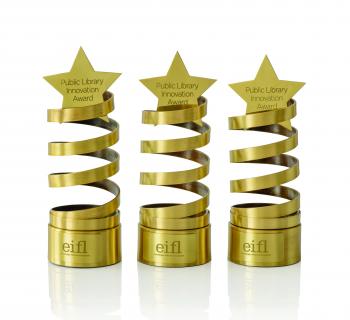
For STEAM (Science, Technology, Engineering, Art and Mathematics) activities in public libraries
The 19th EIFL Public Library Innovation Award call is for public libraries that include STEAM (Science, Technology, Engineering, Arts and Mathematics) activities in their services and programmes.
STEAM is a learning approach that stimulates curiosity and creativity, and builds skills that are useful for education, work and day-to-day life, like problem solving, critical thinking, communications and collaboration.
Public library STEAM activities can involve people of different ages, abilities and genders. They can target specific groups, for example, youth, women, farmworkers, children, seniors or people with disabilities. Or they can target mixed groups, combining different kinds of people, for example, families or community groups.
Public library STEAM activities can be offered online or in-person, and encourage people to explore, research and experiment with digital technology and other learning resources in the library and/or in other environments.
The STEAM activities can be designed and delivered by public libraries or by public libraries in partnership with other organizations, such as schools, universities, non-governmental organizations (NGOs) and local businesses.
Here are a few examples of STEAM activities in public libraries -
- In Kenya, Nakuru Public Library introduced maths classes using Maths-Whizz, an online learning programme that is aligned with the Kenyan school curriculum. Over 600 children from six primary schools took part in maths and computer skills classes in the library. Parents and teachers reported that the fun learning programme helped the children to overcome their fear of maths and improved their test results.
- In Colombia, Gabriel García Márquez Public Library in Bogotá's El Tunal neighbourhood runs a dynamic space called LabCo, where people of all ages can explore robotics and 3D printing and participate in open 'tinkering lab' sessions. The library also facilitates collaborative community research groups in which participants explore shared interests. For example, the 'Science in the Kitchen' learning group explores the connections between local culture, science and cooking.
- In Kazakhstan, Branch No. 2 of the Ust-Kamenogorsk City Library has opened an eco-centre called 'Jasylui'/GreenHouse. The eco-centre is equipped with digital and scientific tools and resources, such as a digital microscope, instruments for measuring air, soil and water quality and a soil-free germinator. Learners can use this equipment in ecological experiments, environmental recovery projects, or simply to explore and understand local nature. To support learners, the library enlists the help of volunteers, including lecturers and teachers of natural sciences and the humanities from local schools and universities.
- In Poland, Olsztyn Municipal Public Library has opened a MultiCentre equipped with computers loaded with software to develop users’ art, music science and technology skills and knowledge. The centre is open to people of all ages and abilities, offering the opportunity to learn and experiment by composing music, drawing caricatures, producing media such as movies and animations and building robots.
- In Lithuania, Utena 'A. and M. Miskiniai' Public Library invites the community to use the Family Digital Activity Centre where children, parents, grandparents and other family members can learn technology skills together. In partnership with a technology company, the library has developed a curriculum comprising introductory and advanced modules for participants to learn about 3D design and printing, computer coding for robotics, operating drones and much more.
WHAT WILL YOU WIN?
- Each winner will receive a trophy, and a prize of US$1,500.
- International publicity – EIFL will share your story widely through its publicity channels.
WHO MAY ENTER?
To enter the competition, you must meet all of the following criteria:
- You must be a public or community library.
- The library must be in a transition or developing economy country [pdf].
- The programme/activity should be new, i.e. started during or after January 2023.
- The programme/activity should have been operational for at least six (6) months, and must be operational at the time of application.
- You must provide evidence of positive results of the programme/activity including statistics regarding the number of people engaged and stories by participants about how the STEAM activities have had a positive impact on their education / work / daily lives by stimulating problem solving, creative, critical thinking, communications and collaboration skills.
Note:
We will not accept applications that:
- Seek funding to start new programmes/activities;
- Only offer access to digital libraries or other digital resources;
- Only provide public access to ICT and general digital skills training.
WHEN CAN YOU ENTER?
The deadline for submitting applications is Monday, 10 November, 2025. The call is currently closed.
NUMBER OF AWARDS
There will be more than one winner. The number of winners will depend on the quality of applications received.
FURTHER DETAILS AND HOW TO APPLY
Application form: English, French, Russian, Spanish
Signature page: English, French, Russian, Spanish
Rules and guidelines for submission
Evaluation criteria
Frequently asked questions (FAQ)
Online Application Submission
